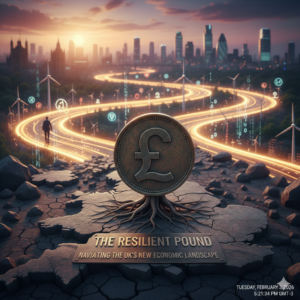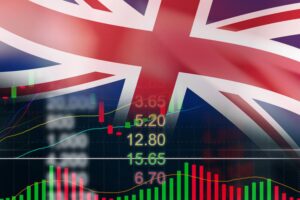
Know How Inflation Unsettles Your Financial Health
It is a word which is thrown around all the time in news headlines and especially in recent years as the UK economy battles global uncertainty, supply chains issues, and a swathe off new monetary policy. But what do those numbers really mean for your money, savings and financial future?
In this explainer, we unpack what inflation is, why it’s important, how it’s calculated in the UK, the crucial ways it affects your everyday finances and — perhaps most importantly — how you can protect your wealth from its effects.
Credit cards can be powerful tools for building credit, racking up rewards and managing cash flow. But the wrong habits can quickly create expensive debt and financial stress — particularly here in the UK, where average household credit card balances are still high. This is a guide that will take you through some practical, no-bs tactics to help you manage your credit cards and not end up in debt in 2025.

📊 What Is Inflation?
Inflation means the increasing price of goods and services over time – aka the decreasing value of your dollars.
For instance, with inflation of 5%, something that costs £100 now, will cost £105 in a year. In practical terms, that means that your money buys less over time unless your income grows at an equal or faster rate.
Key takeaway:
Inflation is the corrosion of your money.
📏 How Does Inflation Get Measured in the U.K.?
In the UK, the key measure of inflation is the Consumer Prices Index (CPI).
✅ Consumer Prices Index (CPI):
Measures how the price of a basket of goods and services frequently purchased by households changes over time, such as food, transport and clothing.
✅ Retail Prices Index (RPI):
An older measure, which is still used for some purposes, such as increasing rail fares and interest on student loans later this year, but is not used as much due to methodological differences.
✅ CPIH:
Includes housing prices and is frequently viewed as a broader measure of inflation.
So far, in early 2025, U.K. inflation remains near 3.5%, below the post‐pandemic peaks but still above the Bank of England’s 2% goal.
🏦 What Causes Inflation?
There are a number of factors that can fuel inflation:
- Demand-Pull Inflation:
When people want what goods and services than are available and are willing to pay enough to outbid others for the limited supply, causing prices to rise.
- Cost-Push Inflation:
Increased costs of production (e.g., energy, salaries) are passed through to consumers.
- Monetary Inflation:
The government doesn’t just weigh in when there’s extraordinary hardship or unsustainable debt; it can also support the currency at a time of plenty by making it radioactive mush. When you add a kilo of cold water (spending with a flood of newly issued money) to a single cup of boiling water (a stock of good money) the temperature of the boiling water will fall (the value of the currency will fall).
- External Shocks:
Supply chains can be disrupted by things like Brexit, the COVID-19 pandemic and geopolitical tensions, leading to rising prices.
💷 What Does Inflation Do to Your Money?
✅ 1. Savings Lose Value
This means that when inflation is greater than the interest you earn on your money, your money loses purchasing power in real terms.
Example:
If you have 10,000 pounds in a savings account that earns 1 percent interest, but inflation is 4, the real return is -3.
Your real purchasing power will be lower a year from now even if the nominal amount seems to have gone up.
✅ 2. Erodes Purchasing Power
Household basics, like grocery shopping or filling the petrol tank, become more costly. If wages do not increase as quickly, families grow pinched by costs of living.
Some UK households have seen food prices, energy bills and mortgage repayments surge in recent inflation hikes.
✅ 3. Impacts Borrowing Costs
To keep inflation in check, the Bank of England frequently increases interest rates.
Greater interest rates mean higher borrowing costs:
Mortgages
Personal loans
Credit cards
Yet they also raise returns on some savings products.
✅ 4. Affects Investments
Inflation can erode the returns on investments, particularly for those that provide fixed income, such as bonds.
But some investments — like stocks and real estate — can act as inflation hedges, or hold their value or appreciate as prices rise.
📈 The Impact of Inflation on Various Financial Products
Financial Product | Impact of Inflation |
|---|---|
Cash Savings | Value declines in real terms if interest is below inflation |
Fixed-Rate Bonds | Returns may be outpaced by rising prices |
Stocks & Shares | Can outpace inflation over long term, but volatile |
Pensions | Future payouts may be worth less unless inflation-protected |
Mortgages | Repayments rise if interest rates increase |
🏠 Real-Life Example: The Impact of Inflation on a UK Household
Joe and Sarah, from Birmingham, spent £500 a month on groceries in 2021. By 2025, after accumulated inflation of 20%, their food bill will by now be £600/month.
If they don’t get raises or spend their money more effectively, their disposable income shrinks, casting the need to decide how to spend and save.
🏁 Conclusion: Keep a Close Watch in an Inflationary Environment
Inflation is one of life’s few certainties, and the impact it has on your money, savings and investments are far reaching.
And in the current climate of ups and downs in the UK interest rates and global uncertainty it’s even more important to:
- Keep track of inflation trends
- Check you’re still getting the best deals with your money products
- Be proactive in safeguarding your money
By knowing how the process of inflation operates, and by modifying your financial plans to account for that — you can limit its affect and keep your money working for you today and tomorrow.
In the end, awareness and action are your best defense against this silent wealth killer called inflation.
Our Post


The Resilient Pound: Navigating the UK’s New Economic Landscape


